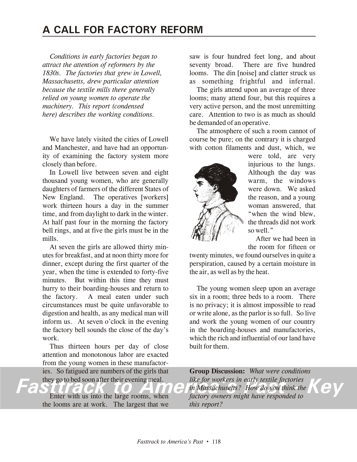| Fasttrack
to America's Past Teacher Key |
|
| Fasttrack
to America's Past Teacher Key |
|
 Page 118 |
Page 118 - A
Call for Factory Reform The reading selection This reading is condensed from a well known account about factory conditions in Massachusetts in the 1840s. The selection here deals mainly with the textile mills in Lowell. The mill town built there was somewhat unique in that the factories made it a practice to hire mostly young women to operate the machines in the factories. The hope of the Lowell factory owners was that the system of employing young women would avoid creating a permanent factory laboring class. The expectation was that the young women would work a few years, marry, and leave to raise their families. The Lowell system worked for a time, but eventually the factories there hired laborers of all kinds. Remind students that work on a farm was no picnic in those days. The conditions described might well have appeared more appealing than farm work to many young women. The factory work also gave them a rare chance to live on their own, not under the control of their parents or a husband. The picture A young woman of the mid-19th century. The textile factories at Lowell, Massachusetts, employed young women in large numbers to operate the machinery. Group discussion
questions The factory conditions
described
in this account would certainly never pass the kind of health and
safety
regulations that exist today.
Factory owners of that
time had plenty
of arguments to defend themselves from such accounts, however.
Farm
work was also hard and dirty. Many people preferred factory work
if given a choice.
|
|
Copyright Notice
Copyright 2018 by David Burns. All rights reserved. Illustrations and reading selections appearing in this work are taken from sources in the public domain and from private collections used by permission. Sources include: the Dover Pictorial Archive, the Library of Congress, The National Archives, The Hart Publishing Co., Corel Corporation and its licensors, Nova Development Corporation and its licensors, and others. Maps were created or adapted by the author using reference maps from the United States Geological Survey and Cartesia Software. Please see the home page for this title for more information. |